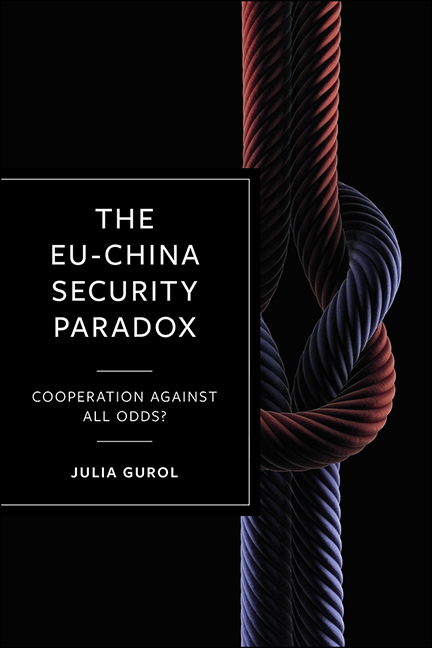Book contents
- Frontmatter
- Contents
- List of Figures
- List of Tables
- List of Abbreviations
- About the Author
- Acknowledgements
- 1 The EU and China in a Changing International Environment
- 2 Analytical Framework: Towards Multidimensionality
- 3 The EU’s and China’s Foreign and Security Policy Principles
- 4 The EU and China on the Global Stage: Interests and Interdependence
- 5 Framing and Perceptions in EU–China Security Relations
- 6 EU–China Relations on Anti-Terrorism
- 7 EU–China Relations on Maritime Security and Anti-Piracy
- 8 EU–China Relations on Climate and Energy Security
- 9 The US: An Elephant in the Room for EU–China Security Relations
- 10 Conclusion and Outlook: The EU and China at a Crossroads
- Notes
- References
- Index
2 - Analytical Framework: Towards Multidimensionality
Published online by Cambridge University Press: 15 September 2022
- Frontmatter
- Contents
- List of Figures
- List of Tables
- List of Abbreviations
- About the Author
- Acknowledgements
- 1 The EU and China in a Changing International Environment
- 2 Analytical Framework: Towards Multidimensionality
- 3 The EU’s and China’s Foreign and Security Policy Principles
- 4 The EU and China on the Global Stage: Interests and Interdependence
- 5 Framing and Perceptions in EU–China Security Relations
- 6 EU–China Relations on Anti-Terrorism
- 7 EU–China Relations on Maritime Security and Anti-Piracy
- 8 EU–China Relations on Climate and Energy Security
- 9 The US: An Elephant in the Room for EU–China Security Relations
- 10 Conclusion and Outlook: The EU and China at a Crossroads
- Notes
- References
- Index
Summary
Introduction
This chapter outlines the analytical framework that guides this book. It rests on research on international cooperation and develops a multidimensional concept of (non-)cooperation. The chapter further details the areas in which the book provides new theoretical insights to research on international cooperation and highlights the book's contribution to the study of cooperation and non-cooperation in international politics. Finally, the chapter concludes with a section discussing the key concepts for the subsequent analysis and orients the reader on the empirical material scrutinized in this book.
Elucidating the odds of cooperation between international actors is one of the primary concerns of IR research and a core element of most theoretical debates. Also, in Chinese IR research, cooperation (referred to as hezuo 合作) is an important concept, albeit one that is only vaguely defined. In IR, which depicts the international system as an anarchic environment cooperation is a puzzle per se. Even more striking is the observation of cooperation between actors that are so inherently different as the EU and China. To understand what motivates them to cooperate, it is necessary to understand the underlying modes and mechanisms of cooperation and noncooperation in international politics in general. The book will now turn to the messiness of different definitions of cooperation and non-cooperation in international politics, also referring to the Chinese understanding of international cooperation, as deeply rooted in Confucianism. The chapter seeks to make sense of this messiness by briefly outlining existing definitions of cooperation and non-cooperation. Based on these definitions, a novel multidimensional lens on (non-)cooperation is developed that understands (non-)cooperation in four different dimensions: the action, formal, institutional and rhetorical dimensions. Finally, the chapter outlines the main concepts that are used as heuristic tools for the ensuing analysis of EU–China security cooperation and concludes by operationalizing these central concepts.
Embracing messiness: (non-)cooperation in international politics
There are a multitude of different and contested conceptualizations of terms such as cooperation, non-cooperation, competition and conflict. Before discussing the understanding of (non-)cooperation as used throughout this book, it needs to be flagged that the Western and Chinese worldviews and basic interpretations of the international community are vastly different.
- Type
- Chapter
- Information
- The EU-China Security ParadoxCooperation against All Odds?, pp. 16 - 37Publisher: Bristol University PressPrint publication year: 2022



